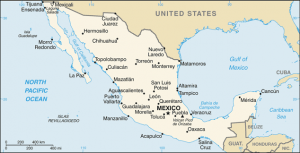Former U.S. President Jimmy Carter and The Carter Center congratulate President Enrique Peña Nieto and the people of Mexico for eliminating onchocerciasis (river blindness) within its borders, as verified recently by the World Health Organization (WHO). Mexico is the world’s third nation to receive official verification of elimination of the disease.

“Together with The Carter Center, Rosalynn and I recognize Mexico’s dedicated river blindness health workers for improving the lives of so many for generations to come,” said former U.S. President Jimmy Carter, founder of The Carter Center. “I am personally committed to wiping out this scourge in the Americas as soon as possible.” Watch President Carter’s video message accepting an award from Merck recognizing the Carter Center’s contributions to the campaign against river blindness in the Americas. A not-for-profit organization, The Carter Center coordinates the regional campaign to eliminate the river blindness through its Onchocerciasis Elimination Program for the Americas (OEPA).
Mexico’s Secretary of Health, Dr. Mercedes Juan Lopez, made the official announcement on Tuesday, Sept. 29, 2015, during a press conference held in Washington, D.C., while she and other ministry representatives were attending the Pan American Health Organization’s (PAHO) 54th annual Directing Council meeting.
Mexico is one of six countries in the Americas that have been affected by onchocerciasis and is the most recent country in the world, after Colombia (2013) and Ecuador (2014), to apply for and be granted verification of elimination of onchocerciasis by the WHO, for which PAHO serves as Regional Office for the Americas. The WHO is the only organization that can officially verify the elimination of a disease.
Guatemala, which has eliminated transmission of the disease and completed its post-treatment surveillance period, officially filed its request for verification of elimination in March of 2015. Today, river blindness transmission in the Americas, only occurs among the indigenous Yanomami people who live deep in the Amazon rainforest in an area that straddles the border of the Bolivarian Republic of Venezuela and Brazil. The two countries have pledged to eliminate the disease from their shared border as soon as possible.
Onchocerciasis is a parasitic disease that afflicts the rural poor. It is caused by a worm that is spread by the bites of Simulium black flies which breed in rapid-flowing rivers and streams. The disease can cause intense itching, eye damage, and irreversible blindness, reducing an individual’s ability to work and learn. Worldwide, an estimated 18 million people are infected and 270,000 blinded by the disease. Onchocerciasis affects countries in Africa and Latin America, as well as Yemen.
For more than two decades, elimination efforts undertaken by the endemic countries and coordinated by the Carter Center’s OEPA have reduced the incidence of transmission to about 25,000 people in the region. The other core partners who have supported the ministries of health of the affected countries include PAHO/WHO, the U.S. Centers for Disease Control and Prevention (CDC), Merck & Co. Inc.’s Mectizan Donation Program, and a host of international partners, foundations, universities, and individuals.
Related:


2 thoughts on “Mexico is the 3rd country to officially eliminate river blindness, Jimmy Carter offers congratulations”